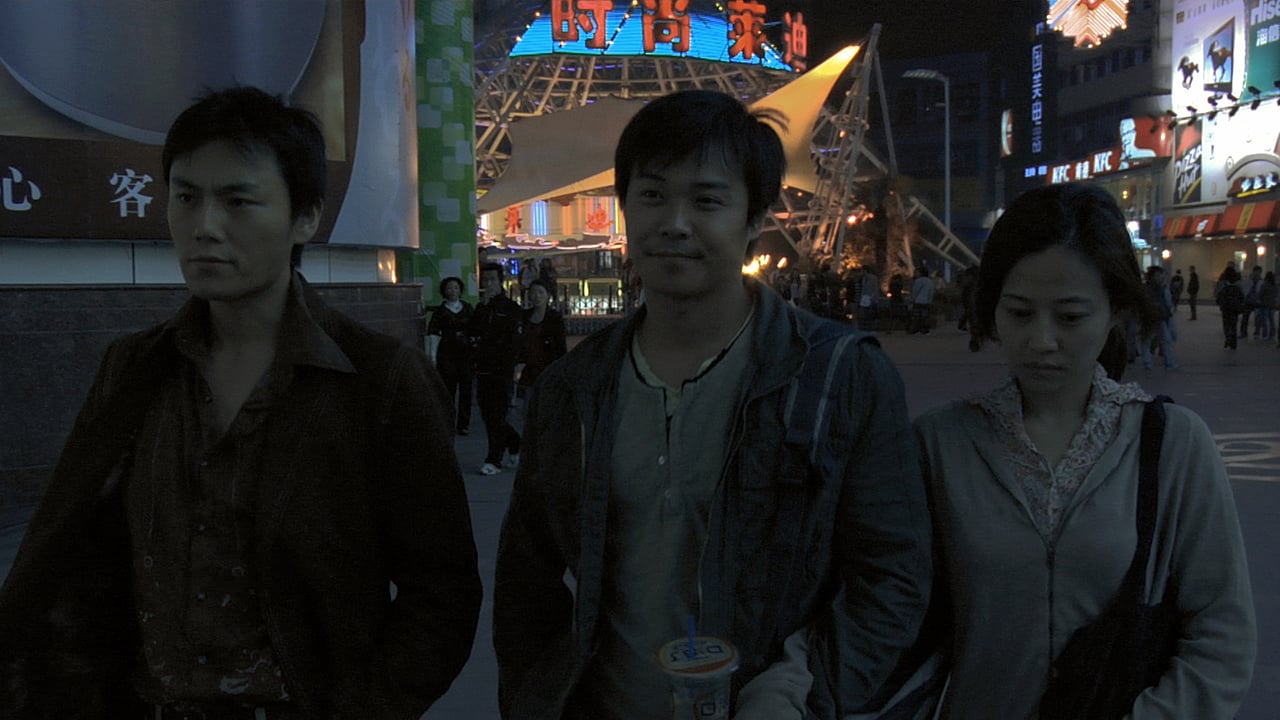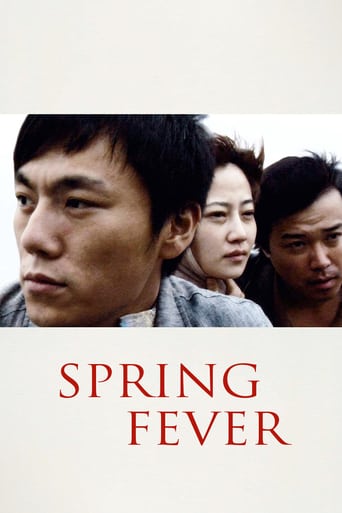



I like the storyline of this show,it attract me so much
View MoreIt is not only a funny movie, but it allows a great amount of joy for anyone who watches it.
View MoreIt's easily one of the freshest, sharpest and most enjoyable films of this year.
View MoreAll of these films share one commonality, that being a kind of emotional center that humanizes a cast of monsters.
View MoreLGBTQ subject has been woefully underrepresented in mainland Chinese cinemascape, which excludes the more liberal soils of Hong Kong and Taiwan, notable bids including Zhang Yuan's novelty-seeking BEHIND THE FORBIDDEN CITY (1996), Hong Kong director Stanley Kwan's tearjerker LAN YU (2001), and this one, a Cannes' BEST SCRIPT winner from Chinese Sixth Generation auteur Lou Ye. SPRING FEVER, its Chinese title is borrowed from a novel from Yu Dafu (1896-1945), a Chinese modern novelist and poet, which literally means: a night deeply drunk on the spring breeze. Its texts are also woven into the narrative, in ultra bold typography, and most significantly, in the finishing shot, evoking a potent sense of nostalgia against a somber palette. Setting in a contemporary Nanjing, the story starts with a tryst between Jiang Cheng (Qin Hao, taking a terrific turn as the backbone of the film, downplaying the stereotype and proudly wearing his heart on his sleeves without much help of lines), a young travel agent and Wang Ping (Wu Wei), a married bookshop proprietor. Wang's suspecting wife Lin Xue (Jiang Jiaqi) hires Luo Haitao (Chen Sicheng, a far cry from a dewy-eyed 27-year-older) to shadow his husband and when their affair is debunked, Jiang ends the relationship but Wang clearly cannot get over him. A bi-curious Luo begins to hobnob with Jiang, follows him in a club where the latter gives a drag performance and is ready to get his feet wet in an unbeaten path, meanwhile, Luo's girlfriend Li Jing (Tan Zhuo, a lookalike of Lou's muse Hao Lei), who works in a fabric factory, is given special attention from her Cantonese-sporting boss (Zhang Songwen), but his business is not exactly law-abiding. Then midway through, the narrative gears down its dramatic thrust by adjusting its fulcrum onto an attempted ménage-à-trois shaping up during a lackadaisical sortie, imbuing a poetic atmosphere into an invisible cul-de-sac, all three parties are curtailed by their vacillations, which is brilliantly writ large in the karaoke segment, singing the same song THOSE FLOWERS, but there is something incompatible dangling in the air, presaging their ensuing rupture. For my money, Lou's most extraordinary achievement is that he takes no prisoner in laying bare the self-defeating wishful thinking of having-your-cake-and-eat-it, a mindset so pandemic yet so difficult to resist. Most characters are riddled with this inimical ambiguity and cannot see an outlet, Wang Ping wants both his marriage and his boyfriend, Luo Haitao is both physically and emotionally gravitated to Jiang but also cannot let go of Li Jing, his last resort of being normal; and Li Jing, all the more, is stuck in the quagmire where she secretly expects her boss' commitment (which he never utters) but also harbors deep affection to Luo. In an odd way, it is Jiang Cheng, who has evolved into the most lucid-minded one here, he is able to cut the Gordon cord, not once but twice when he can see clear of the situations, thus, although one can niggle that tragedy again banally creeps into a gay story, but in the end of the day, Lou meritoriously inculcates us with his sage advice of making peace with oneself after inevitable detours through Jiang's baptism of fire (and blood).Characterized by Lou's modus operandi, namely a lurking hand-held camera under the natural light, SPRING FEVER refuses to paper over its unappealing milieu (billows of steam and smog give an authentic look of the city itself, without its usual tourist-attracting designs), what on screen is perpetually dun and crummy, sometimes even blurry, yet leavened by Lou's even-handed calculation, ultimately, the film is intimately inviting and rewardingly pensive.
View MoreI watched "Spring Fever" with my older brother and we thought that it was a really good movie actually, despite the intense sexual scenes in the beginning and dispersed lightly throughout. It felt like a real, gritty movie, enhanced with hand-held video cameras and such. It was raw in emotion. My brother even confessed to me it moved him because he felt for the husband Wang Ping, who was married yet seeing another man. He relented that he understood that inner struggle and turmoil it was to know you are one way yet feeling bound to live another way in order to please people around you. To be honest, the movie is for mature audiences, but that doesn't mean the feeling of the movie is lost in that sense.
View MoreThis film by the director of SUMMER PALACE, which depicted turbulent relationships at the time of the 1989 Tiananmen Square massacre, is a murky five-way gay romance that's so depressed-feeling it's surprising there's only one suicide. According to Derek Elley's Variety review the director bypassed the five-year film-making interdiction his previous effort brought on by listing this as a HongKong-French co-production, though it was shot "in Nanjing, central China, on digital equipment," and transferred to 35 mm. -- not entirely successfully, judging by the extremely dark interiors, which lose the desired sense of metaphysical longings influenced by changing weather (and oncoming spring). The action isn't so easy to follow at a basic level, either. There's intense gay sex at the beginning (and scattered throughout). It develops that the one married partner in the affair is being followed at his wife's behest and photographed. She violently confronts her husband and humiliates the other man publicly at his place of work. Later, the man who tailed the lovers loses interest in his g.f. and becomes attracted to the unmarried gay man, whose talents include singing in drag. There is a sequence when three of the principals overcome grief by doing some Karaoke singing and then go on a momentarily successful car odyssey together. Elley thinks this film better organized (despite its desultory later developments) than SUMMER PALACE, but still far inferior to SUZHOU RIVER or even the flawed but interesting PURPLE BUTTERFLY. To my mind, SUMMER PALACE was more interesting, its scenes more atmospheric. There was a sense of excitement around the impending revolt, a feel of palpable historical urgency. SPRING FEVER may attract some festival audiences and work best at gay series, but its literary quotations and moodiness only heighten its clumsy feel. If Lou Ye was trying to channel Wong Kar-wai (of HAPPY DAYS, say), he ought to have hired Chris Doyle and directed his actors better. Some French critics were impressed through all the mess (Allociné rating 2.3/46) and this was shown at Cannes. But it's still a mess. Seen in Paris at MK2 Beaubourg (to a packed house) in April 2010.
View MoreI attended the North American Premiere of "Spring Fever" at the 2009 Toronto International Film Festival. A co-production of Hong Kong and France, director Ye Lou's "Spring Fever" is quite a unique film about a gay love triangle. There's very little dialogue, which is a device I normally relish, but here it just drags out the already minimal action. The film is shot with all hand-held and shaky camera style, using lots of extreme closeups. It might not have been that hard to handle except that the picture itself was very dark at times so it was often difficult to even see what was taking place. I don't know if it was the source print, digital transfer, or projection, but it made for a very disappointing experience.
View More